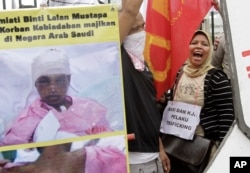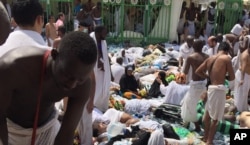As Saudi Arabia and Indonesia signed a $1 billion investment deal during King Salman bin Abdulaziz Al Saud's historic visit, many ordinary Indonesians aired their grievances with the desert kingdom. In Jakarta, several dozen protesters brought attention to the ongoing maltreatment of Indonesian migrant workers in Saudi Arabia. Also seeking answers were the families of Indonesian citizens killed in two accidents at the 2015 Hajj in Mecca, who have received no compensation from either government nearly two years after the tragedy.
This is the first time a sitting Saudi monarch has visited Indonesia in 47 years, and citizens rolled out the red carpet for King Salman and his entourage of 1,500 in Bogor and Jakarta. But the king is spending the better part of his trip, from March 4 to 9, vacationing in Bali. As he wrapped up his third and last day in Java by leading prayers at Jakarta’s Istiqlal Mosque, aggrieved Indonesians suspect they are still far from resolving their concerns.
Migrant workers
About three million Indonesian migrants seek overseas work, due in part to high domestic unemployment. Estimates of the number of Indonesian workers in Saudi Arabia differ wildly, from 379,632 (according to the Asian Migrant Center in 2013) to 38,104 (according to Indonesia’s National Agency for the Protection and Placement of Indonesian Migrant Workers in 2014). One reason for this variance is the difficulty of accounting for illegal or undocumented migrants. Indonesia has discouraged its citizens from working in Saudi Arabia due to poor working conditions and some high-profile criminal convictions.
Two Indonesian women, Karni Bt. Medi Tarsim, 37, and Siti Zaenab Bt. Duhri Rupa, 47, were separately convicted of murdering their bosses and executed in 2015, which caused a furor in Indonesia. Human rights groups objected to their convictions, citing the dire circumstances that the women claimed provoked their crimes. As of 2013, the majority of migrant workers on Saudi Arabia’s death row are Indonesians, according to the London-based newspaper, The Guardian.
Despite the ongoing debate about the allegedly inhumane working conditions for Indonesian workers in Saudi Arabia - including physical abuse, sexual violence, overwork, and withheld payments - there was no mention of migrant workers in the Memorandums of Understanding signed between Indonesia and Saudi Arabia this week.
On Thursday, dozens of activists protested outside the Saudi embassy in Jakarta to lobby for explicit recognition of worker rights during the state visit. About a dozen men were arrested shortly after the protest began and removed from the site by police. The group, which called itself the “Big Family of Indonesian Migrant Workers,” urged King Salman to free 25 Indonesian citizens on death row. Up to 279 Indonesians faced death row as of April 2015, according to a Manpower Ministry official.
Ultimately, activists were largely resigned to the fact that migrant workers were not mentioned in discussions between President Joko Widodo and King Salman.
“The eleven MoUs [Memorandums of Understanding] signed on Wednesday focused on economic issues, so they were not the best place in which to discuss human rights,” said Wahyu Susilo, executive director of the advocacy group Migrant Care.
“But that’s not to say the government should give up on this issue," Wahyu told VOA. “The Ministry of Foreign Affairs needs to be more proactive about diplomatic protections for Indonesian emigrants. And the Ministry of Finance must supervise the worker recruitment process much more closely.” He said many underage Indonesians, for instance, are recruited with falsified documents and brought unsuspectingly to work in “dangerous countries” like Saudi Arabia.
Several members of Indonesia’s parliament have also appealed to the king to grant clemency to convicted migrant workers and for the government in Jakarta to raise the issue with the visiting monarch. President Widodo’s administration has not commented on the matter and it is not clear if the issue was raised in his private meeting with the king.
VOA was unsuccessful in its efforts to reach a presidential spokesman for comment. Spokespeople from the Ministry of Religion and Widodo’s office told VOA they were unable to comment on what transpired in the private meeting between the president and King Salman.
Hajj tragedy, quotas
In 2015, Indonesians were affected by not one but two deadly accidents related to the Hajj, the annual pilgrimage to Mecca, Saudi Arabia. One hundred twenty-seven Indonesians were among those killed in a deadly stampede in September and 12 more were killed a week before the Hajj officially started, when a crane collapsed near the Grand Mosque.
Saudi Arabia promised one million riyals, or about $267,000, as compensation for the 12 Indonesians killed and 49 injured from the crane accident. But nothing has been received as of February 2017, according to the Indonesia daily newspaper, the Jakarta Post.
The annual Hajj quota is extremely important to Indonesia, the world’s largest Muslim nation. Its current quota is 221,000 people, the most of any country in the world, but some citizens still wait over 20 years for their chance to be a pilgrim. Although Indonesian officials hoped to increase their quota this year, this issue too seems to have been omitted from the agreements signed this week.
Preserving the quota may have been one reason why Indonesia didn't press Saudi officials harder on compensation for the Hajj victims, said Dadi Darmadi, a researcher at Syarif Hidayatullah State Islamic University in Jakarta.
“Any ‘failed efforts’ at Hajj organization would be unappealing for the masses,” Darmadi told VOA. Since the Hajj has long been a “top priority” for officials, he said, if they somehow jeopardized the country’s allowance, “people could easily think the government is not serious in handling religious affairs” - anathema in the profoundly religious country.
“I think the Indonesian government is also using political sensibilities not to be too pushy about it … such a rare visit by King Salman also is like a moment of ‘unfreezing’ the heat of the political temperature in the country during the [contentious] Jakarta election,” said Darmadi.
The Ministry of Religious Affairs reaffirmed its commitment to compensating the accident victims in a comment to VOA. According to a ministry spokesperson, the process has been held up by the fact that all of those affected have not yet submitted their "victim data" to the Saudi Embassy.
"It's not possible for the Indonesian government to force Saudi Arabia to accelerate the process, because the authority lies with their government," the spokesperson said. "And as per the Minister of Religious Affairs, Lukman Hakim Saifuddin, Raja [King] Salman himself promised to take care of it, eventually." He added that the Saudi government has set up a team headed by the Governor of Mecca to work on the cases.
Besides the unresolved issues raised by labor activists and families of Hajj victims, King Salman’s trip fell short by other metrics. Before his visit, government leaders hoped for investments of up to $25 billion, but ultimately, the king signed only one new deal, for $1 billion, to finance infrastructure and sanitation projects.






